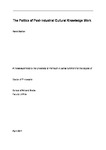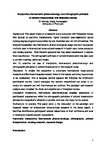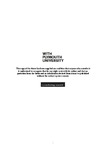The Politics of Post-Industrial Cultural Knowledge Work
| dc.contributor.supervisor | Ascott, Roy | |
| dc.contributor.author | Stettler, René | |
| dc.contributor.other | Faculty of Arts, Humanities and Business | en_US |
| dc.date.accessioned | 2011-06-07T10:34:28Z | |
| dc.date.available | 2011-06-07T10:34:28Z | |
| dc.date.issued | 2011 | |
| dc.identifier | 372234 | en_US |
| dc.identifier.uri | http://hdl.handle.net/10026.1/481 | |
| dc.description | Orignal file updated with a new version at the request of the author on 16.06.14 by NC TIS | |
| dc.description.abstract |
This dissertation conducts in-depth inquiries into the practices, nature and theory of post-industrial cultural work and the humanities- and arts-based civic dialogues which cultural work promotes. Given the broad neglect of utopian thinking in the mainstream of critical social science and in an attempt to sketch out a vision of an alternative future, the aim of this thesis is to outline an “epistemology” for post-industrial cultural work as well as to reflect upon the outlook for educational cultural work practices and their function as a catalyst for civic dialogue and cultural change. The main concerns are the signification, interests and aims embodied in cultural production touching on issues of cultural and scientific learning, alternative modes of democratic governance of science and technology (Felt, Wynne et al. 2007), industrial society’s logic of accumulation and market rationality, the primacy of contemporary instrumental and capitalist values, neoliberalism, globalization and cosmopolitanism. With a view to addressing elementary questions regarding the future of cultural work, which are explored and theorised alongside future perspectives of a new form of knowledge work for the humanities and the arts, the actual challenges of cultural work are considered from within the wider context of the risk society (Beck 1986) and the threats which affect everybody today. In relying on Beck’s (2009) conceptualization of the world risk society as a “non-knowledge society” characterised by the global existence of incalculable risks/threats and non-knowing, the thesis addresses the problem of non-knowledge and unrecognised contingencies as a challenge for cultural work to design processes of (un)learning in civic dialogues. In exploring the social, cultural and political relevance of three empirical case studies, the thesis ventures into the prospects of a new socio-epistemological perspective for cultural work and workspaces for knowledge. The studies investigate three different (techno-)socio-cultural spaces of knowledge: a public exhibition about the new Gotthard Base Tunnel currently under construction in the Swiss Alps, Jennifer Baichwal’s film Manufactured Landscapes (2006) about the Canadian photographer Edward Burtynsky and China’s industrial revolution, and the living intervention Fairytale at Documenta 12, 2007, which brought 1,001 Chinese citizens to Kassel, Germany. Actor-Network Theory (ANT) is employed as a tool for the analysis of the material-semiotic properties of differing knowledges, the heterogeneous relations of socio-economic networks, and the global and uncertain conditions of the post-industrial world in which cultural work is embedded. What is colloquially referred to as post-industrial cultural knowledge work in this thesis is elaborated in the context of a propositional socio-epistemological second-order framework (Von Foerster 1984; Pakman 2003) for cultural work and its entanglements with ethics, aesthetics, pragmatics, politics—and biopolitical production (Hardt and Negri 2000; 2009). In order to build “third spaces” of knowledge (Turnbull 2000) and to nurture uncertainty-oriented approaches and contingencies, the findings propose the development of more open, (self-)reflexive and anticipating forms of thinking and acting in cultural production fields with the aim to catalyse societal developments, to foster intrinsic values and to create cultural workplace identities with a moral-ecological-political awareness (cf. Banks 2006; 2007) invoking new interactions between viewers, audiences and the environment. | en_US |
| dc.language.iso | en | en_US |
| dc.publisher | University of Plymouth | en_US |
| dc.subject | Epistemology and theory of post-industrial cultural work | en_US |
| dc.subject | Cultural work and second-orderness | |
| dc.subject | Humanities- and arts-based civic dialogues | |
| dc.subject | Cultural and scientific learning | |
| dc.subject | Spatialisation and dissemination of knowledge | |
| dc.subject | Cultural workplace identity | |
| dc.subject | Moral-ecological-political awareness | |
| dc.subject | Culture and society | |
| dc.subject | Actor-network theory and material semiotics | |
| dc.subject | Knowledge politics | |
| dc.title | The Politics of Post-Industrial Cultural Knowledge Work | en_US |
| dc.type | Thesis | en_US |
| dc.identifier.doi | http://dx.doi.org/10.24382/1410 |
Files in this item
This item appears in the following Collection(s)
-
01 Research Theses Main Collection
Research Theses Main




